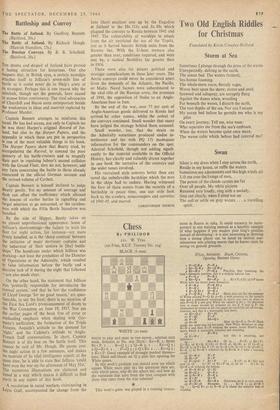Battleship and Convoy
The Battle of Jutland. By Geoffrey Bennett. (Batsford, 30s.) The Battle of Jutland. By Richard Hough. (Hamish Hamilton, 15s.) The Russian Convoys. By B. B. Schofield. (Batsford, 30s.) THE drama and despair of Jutland have proved a lasting attraction for historians. One also suspects that, in British eyes, a certain nostalgia attaches itself to Jellicoe's seven-mile line of battle as it could never do to Haig's army at its strongest. Perhaps this is one reason why the admirals, though not the generals, have ceased to arouse bitter controversy. The rival advocacies of Churchill and Bacon seem unimportant beside the weaknesses in ideas and materiel explored by Professor Marder.
Captain Bennett attempts to reinforce this trend. He has had access, not.only to Captain (as he was then) Harper's original Record of Jut- land, but also to the. Harper Papers, and the appendix in which these are put in perspective is one of the most valuable things in his book. The Harper Papers show that Beatty tried, by manipulating the Record, to conceal the poor gunnery of his battle-cruisers and to magnify their part in repulsing Scheer's second collision with the Grand Fleet; they do not, however, add any facts concerning the• battle to those already contained in the official German account and the revised volume of Corbett.
Captain Bennett is himself inclined to judge Beatty gently. Yet no amount of courage and dash can offset the inefficiency which allowed the lessons of earlier battles in signalling and target selection tO go unlearned, or the careless- ness with which the Fifth Battle Squadron was handled.
By the side of Hipper, Beatty takes on an almost unprofessional appearance. Some of Jellicoe's shortcomings—the failure to train his fleet for night action, for instance—are more firmly handled, as is the 'sharp contrast' between the initiative of many destroyer captains and the behaviour of 'their seniors in [the] battle- ships.' The handicaps under which Jellicoe was working—not least the prejudices of the Director of Operations at the Admiralty, which resulted in false information before the battle and a decisive lack of it during the night that followed are also made clear.
On the other hand, the statement that Jellicoe was `primarily responsible for introducing the convoy system,' and that he lost the confidence of Lloyd George 'for no good reason,' are ques- tionable, to say the least; there is no mention of the First Sea Lord's pronouncement of doom to the War Committee on June 19, 1917. Nor are the earlier pages of the book free of error or misleading' emphasis when dealing with Ger- many's unification, the formation of the Triple Entente, Asquith's attitude to the demand for 'eight,' and the Cabinet's attitude to Anglo- French Staff conversations. In short, Captain Bennett is at his best on the battle itself. This cannot be said of Mr. Hough. He passes over the night action in a few sentences, and makes no mention of its vital intelligence aspect; at the same time, he is able to state that Jellicoe 'could have won the war on the afternoon of May 31st.' The numerous illustrations are cluttered and tinted in a way which makes it difficult to find merit in any aspect of this book.
A revolution in naval warfare, culminating in Ltyte Gulf, accompanied the change from the lone Short seaplane sent up by the Engadine at Jutland to the He. Ills and Ju. 88s which plagued the convoys to Russia between 1941 and 1945. The vulnerability of warships to attack from the air restricted the use of the Tirpitz, just as it barred heavier British units from the Barents Sea. With the U-boat menace also greater than ever, conditions required, and were met by, a tactical flexibility far greater than in 1916.
There were also far greater political and strategic complications in these later years. The Arctic convoys could never be considered apart from the demands of the Atlantic, the Pacific, or Malta. Naval factors were subordinated to the vital role of the Russian army, the promises of 1941, the opposition of Stalin to an Anglo- American base in Iran.
By the end of the war, over 77 per cent of Anglo-American goods delivered to Russia had arrived by other routes, whilst the ordeal of the convoys continued. Small wonder that many have judged the strategy behind them unsound.
Small wonder, too, that the strain on the Admiralty sometimes produced undue in- terference and (as with PQ 17) inadequate information for the commanders on the spot. Admiral Schofield, though not adding signifi- cantly to the material available in the Official History, has clearly and valuably drawn together in one book the narrative of the convoys and the wider issues involved.
His restrained style conveys better than any novel the unbelievable hardships which the men in the ships had to endure. Having witnessed the fury of these waters from the security of a battleship in peace time, one can only look back to the trawlers, minesweepers and corvettes of 1941-45, and marvel.
CHRISTOPHER THORNE




























 Previous page
Previous page